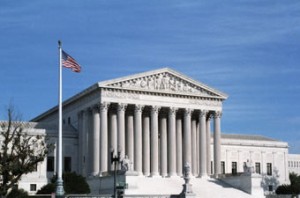 The U.S. Supreme Court is scheduled today to hear oral arguments in Kirtsaeng v. Wiley, a case which revisits the relationship between the Copyright Act’s limits on importation of a copyrighted work without permission and the first sale doctrine.
The U.S. Supreme Court is scheduled today to hear oral arguments in Kirtsaeng v. Wiley, a case which revisits the relationship between the Copyright Act’s limits on importation of a copyrighted work without permission and the first sale doctrine.
Supap Kirtsaeng helped to finance his doctorate in mathematics by having freinds and family send him copies of textbooks sold a a lower price in Thailand and then selling them in the United States. Although these books were lawfully purchased in Thailand, Kirtsaeng was sued by John Wiley & Sons for copyright infringement.
[The case may be postponed due to a hurricane in Washington D.C., but as of 8am, the court has not yet postponed it.]
Numerous briefs have been filed by third parties supporting both sides, available here.
eBay attorney Hillary Brill told Ars Technica that “This case is an attempt by some brands and manufacturers to manipulate copyright law, to control the distribution and pricing of legitimate, authentic goods. When an American purchases an authentic item, he shouldn’t have to ask permission from the manufacturer to do with it what he wants.” Similarly, Sherwine Siy from Public Knowledge wrote in a blog that the case “could decide whether or not you fully own your own books, CDs, DVDs, and all your other things that contain copyrighted works—particularly if they were made outside the US.”
Andi Sporkin from the Association of American Publishers wrote “When grey market goods are US copyrighted works produced for and intended for sale only in foreign markets, the importation of these copies into the US without the permission of the copyright-holder constitutes an infringement of the owner’s distribution and importation rights under US copyright law. The U.S. Copyright Act, as amended in 1976, gives copyright-holders exclusive rights over how their products are reproduced and distributed and grants them rights against acts of importation. Such actions violate those rights.”




